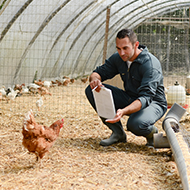New avian influenza guidance for vets

The guidance follows multiple recent findings of avian influenza in recent weeks.
New guidance has been published for veterinary professionals who see wild birds and backyard poultry in practice.
The guidance - jointly developed by the BVA, the British Veterinary Poultry Association (BVPA), the BSAVA and the British Veterinary Zoological Society (BVZS) – outlines the clinical signs of avian influenza, how to examine suspected cases, next steps and how to report.
It follows multiple findings of avian influenza in recent weeks and the introduction of new housing measures that require all bird keepers to keep their flocks indoors.
James Russell, BVA senior vice president, said: “The Chief Veterinary Officers have taken swift action in response to several outbreaks in recent weeks, and brought in robust measures to contain the spread of the disease as much as possible.
“Wild birds migrating to the UK from mainland Europe in the winter months can carry the disease and infect other species of bird, so it’s vital that veterinary professionals who may be seeing poultry and wildlife casualties in practice know how to spot the signs and act quickly if presented with suspected cases.”
The latest government update on avian influenza on 3 December confirmed the presence of avian influenza (HPAI) H5N1 at a sixth premises in Thirsk, North Yorkshire. The update also confirmed the disease at premises in Staffordshire and Herefordshire.
Liz Mullineaux, BVZS senior vice president, said: “The current avian influenza situation in the UK is rapidly changing on an almost daily basis. This is clearly very difficult for veterinary colleagues in the poultry sector, but also presents some problems for those in general practice working with both backyard poultry and wild birds.
“The joint guidance should provide some useful practical background material for those in practice, as well as links to all the up to date Defra information.”



 The Federation of Independent Veterinary Practices (FIVP) has announced a third season of its podcast, Practice Matters.
The Federation of Independent Veterinary Practices (FIVP) has announced a third season of its podcast, Practice Matters.